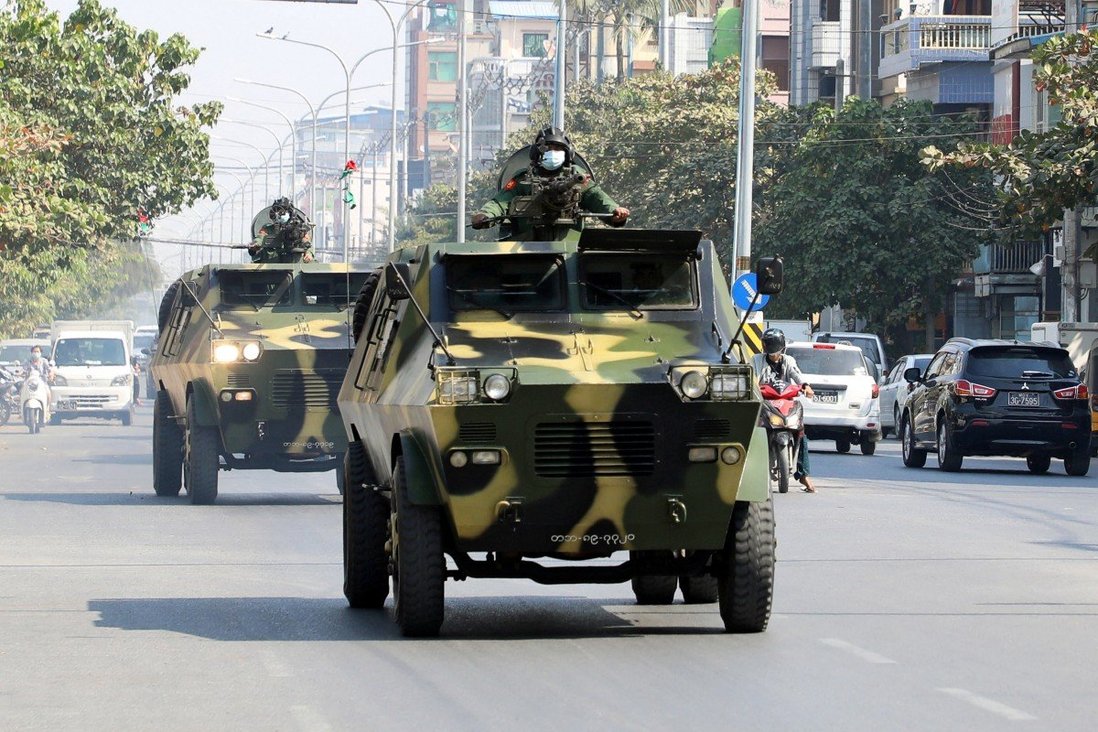www.aljazeerah.info
Opinion Editorials, February 2021
Archives
Mission & Name
Conflict Terminology
Editorials
Gaza Holocaust
Gulf War
Isdood
Islam
News
News Photos
Opinion Editorials
US Foreign Policy (Dr. El-Najjar's Articles)
www.aljazeerah.info
Myanmar Coup Highlights Risks for Chinese Investors Working Overseas By Laura Zhou SCMP, February 7, 2020 |
 |
 |
|
|
Myanmar coup military vehicles |
Very few Chinese firms operating in Southeast Asia conduct proper risk assessments, which makes them vulnerable during power changes, researcher says Companies need to be more vigilant in assessing the potential for collateral damage, academic says
China is a long-time supplier of weapons to Myanmar’s military. Photo: Reuters The recent unrest in Myanmar should serve as a reminder to Chinese investors of the political risks involved in financing projects overseas, especially in Southeast Asia, and the importance of performing due diligence, observers say. “ Aung San Suu Kyi , who has been in power [in Myanmar] for five years and whose party won the election, might have looked to have been in a very secure position,” said Yin Yihang, a researcher on Myanmar affairs with the Taihe Institute think tank in Beijing.
“But in fact, if you look deeper, the military is still very powerful and geopolitical risks in the country remain high.”
Yin said that compared with their counterparts from Japan and South Korea, very few Chinese firms doing business in Southeast Asia carried out risk assessments, preferring to build ties with local governments, which made their investments vulnerable during power changes.
That was particularly the case in countries like Myanmar and Cambodia , where Chinese investors, usually in association with local authorities, were active across the spectrum of industries, he said.
“[Cambodia] appears to be a stable country as the Hun Sen government has been in power for a long time, but once a power change takes place, the impact on society, including the investment environment, will be huge,” Yin said.
“That’s why it’s important for Chinese investors to make a good assessment beforehand and to take a longer term view.”
Many foreign investors were caught off guard when the military seized control of Myanmar on Monday and detained de facto leader Suu Kyi and hundreds of other lawmakers.
Qi Kai, a senior fellow at the China Overseas Security Research Institute, said Chinese investors, particularly state-owned companies, needed to be more vigilant in assessing the potential for collateral damage.
In 2018, Malaysian Prime Minister Mahathir Mohamad threatened to cancel a China-backed railway project signed by his predecessor Najib Razak who would later be found guilty of corruption. Although the deal was renegotiated, the case was seen as a major setback to Chinese President Xi Jinping’s Belt and Road Initiative .
“One lesson that can be drawn is that Chinese investors, especially big state-owned operations with a large presence in a foreign country, should strengthen their strategic assessment to hedge against risks,” Qi said.
People burn a portrait of army chief General Min Aung Hlaing as they protest against the military coup in Myanmar. Photo: Reuters
Major Chinese investment in Myanmar dates back to 2004 when the two countries agreed to build oil and natural gas pipelines between southwest China’s Yunnan province and Myanmar’s deep water port of Kyaukphyu in the Bay of Bengal.
The multibillion-dollar project, backed by state-owned China National Petroleum Corporation, was branded as a success for the belt and road plan. Since then, Chinese firms have invested heavily in Myanmar’s mining and energy sectors, and Beijing was the largest source of foreign assistance after Western nations removed their aid following the crackdown on pro-democracy protests in 1988.
And when Myanmar began its political reforms and promised to open up its markets to foreign investors in 2011, Chinese firms were among the first to get involved.
Dane Chamorro, a partner at Control Risks Group, said Beijing, which had for decades been a major supplier of weapons to Myanmar’s military rulers, had been walking a fine line since Suu Kyi’s National League for Democracy (NLD) rose to power five years ago.
“China came under criticism domestically and internationally for its support of the Myanmar military government and also for some of its belt and road investment projects,” Chamorro said.
“China recognises the NLD is not going away and in fact is very popular with Myanmar voters, so they can’t openly support this military takeover too strongly despite the fact it’s executed by a group with which they have very close military and business ties.”
US President Joe Biden
responded to the coup in Myanmar by threatening to impose sanctions. That could create problems for Chinese companies if Washington bans firms that deal with Myanmar from working with America, as it did with Iran.“Chinese companies, especially large state-owned companies that are listed in the US, may be caught in the crossfire, and operational risks will be high if transactions in US dollars are banned,” Qi said.
Since Myanmar suspended the US$3.6 billion China-backed Myitsone hydropower project in 2011 for environmental reasons, Chinese investors had been more cautious, Yin said.
China must also be aware of the possible backlash from the public and human rights groups if it is seen to support the latest military takeover.
On Thursday, thousands of social media users in Myanmar joined a campaign denouncing China and Russia for reportedly blocking a UN Security Council statement condemning the coup.
Ji Lin, executive secretary for programme development at the Global Environmental Institute NGO in Beijing, said Chinese investors needed to rethink their strategy.
“Chinese investors have to understand that governments change, be it through an election or a coup,” she said.
“For Chinese investors that are involved in long-term infrastructure projects that require decades of maintenance, that means building a long-term relationship with local communities.”
***Laura Zhou joined the Post's Beijing bureau in 2010. She covers China's diplomatic relations and has reported on topics such as Sino-US relations, China-India disputes, and reactions to the North Korea nuclear crisis, as well as other general news.
***
Share the link of this article with your facebook friends
|
|
|
|
||
|
||||||


